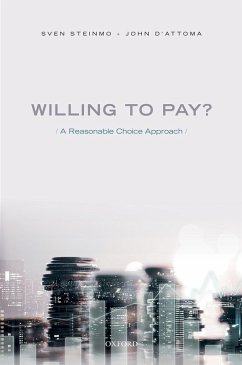
Divided (eBook, ePUB)
Open-Mindedness and Dogmatism in a Polarized World
Redaktion: Ottati, Victor; Stern, Chadly
Versandkostenfrei!
Sofort per Download lieferbar
37,95 €
inkl. MwSt.
Weitere Ausgaben:

PAYBACK Punkte
19 °P sammeln!
If you tune into televised newscasts or read any newspaper, it is impossible to ignore the increased polarization of political discussion. These news reports are supported by empirical research documenting increases in social and political polarization. Polarization is not completely undesirable, as differences between groups can contribute to a vibrant democratic life in which alternative solutions to social problems are fully explored. However, polarization can also produce dysfunctional outcomes, including sub-optimal decision-making processes within groups and a lower likelihood that compe...
If you tune into televised newscasts or read any newspaper, it is impossible to ignore the increased polarization of political discussion. These news reports are supported by empirical research documenting increases in social and political polarization. Polarization is not completely undesirable, as differences between groups can contribute to a vibrant democratic life in which alternative solutions to social problems are fully explored. However, polarization can also produce dysfunctional outcomes, including sub-optimal decision-making processes within groups and a lower likelihood that competing groups are able to resolve differences. Extreme forms of polarization are presumably exacerbated by dogmatic or closed-minded thinking that fails to openly consider the viability of opposing viewpoints, as well as low levels of intellectual humility in which people rarely consider the possibility that their own beliefs and opinions might be fallible. This volume aims to increase the understanding of open-mindedness and dogmatism, illuminate the nature and causes of polarization, and provide clues regarding how one might attempt to reduce pernicious forms of polarization. Bringing together a diverse group of leading psychologists, political scientists, sociologists, and communication scholars who investigate dogmatism and open-mindedness within social and political contexts, Divided: Open-Mindedness and Dogmatism in a Polarized World covers a wide range of topics including key definitions of dogmatism and open-mindedness, the emergence of affective polarization, how open-mindedness relates to attitude formation and change, the correspondence between intellectual humility and open-mindedness, and how social norms and situations shape open-minded cognition. Authors consider both the beneficial and more problematic features of open-mindedness, dogmatism, and polarization. Collectively, this volume provides a format that enables readers to learn about creative approaches to understanding dogmatism and open-mindedness and, potentially, to generate innovative solutions that reduce polarization and increase constructive social compromise in the future.
Dieser Download kann aus rechtlichen Gründen nur mit Rechnungsadresse in A, B, BG, CY, CZ, D, DK, EW, E, FIN, F, GR, HR, H, IRL, I, LT, L, LR, M, NL, PL, P, R, S, SLO, SK ausgeliefert werden.













